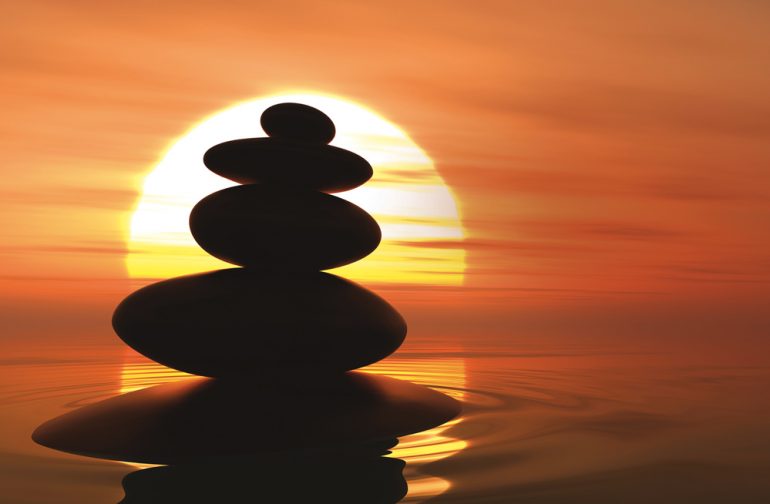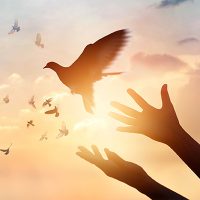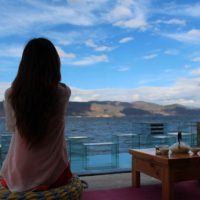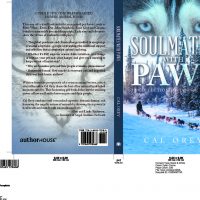On new Year’s Eve 2008, my father, Peter daniel Hudis, breathed his last. It was a fitting time for his life to culminate. dad had always loved new Year’s Eve. He enjoyed singing “Auld lang Syne,” listening to the ships sounding their sirens in the port and first-footing across the threshold with a lump of coal. He loved the sense of adventure and freshness that each new Year of his long life brought. After sitting with his body for some time, I left the ward, together with my siblings. As we exited the hospital into the car park, the sky lit up with celebratory fireworks. Church bells pealed through frosty air. It was the stroke of midnight and a new year was beginning in joy and loud cheering. never before had I felt so strongly the words embroidered by Mary Queen of Scots while in prison before she was beheaded— “In my end is my beginning.”
That frosty night was not my father’s first encounter with Yama, the lord of death. My parent’s love story was a remarkable one, not simply because it played out against the backdrop of the london blitz, not even because relationships between Jews and Christians, such as theirs, were rare and frowned upon at the time. At seventeen, shortly after meeting my mother, my father was diagnosed with pulmonary tuberculosis and sent away to a sanatorium. There was no cure for tuberculosis in 1942, and after some months, he was sent home to die. But love healed what no medicine could. Sixty-six years, four children, five grandchildren, many mountain peaks and a golden wedding anniversary lay ahead before he did indeed die, as each of us must.
My father’s time in the sanatorium was a sojourn in the halls of death. He was given the job of pushing the library trolley from ward to ward, a chilling experience that offered him a weekly glimpse of what lay ahead of him, as he visited the wards full of more advanced cases. This time in the hall of Yama, together with the daily brushes with death he had experienced in london during the Battle of Britain, made my father resolve to live his life in the cause of peace, raising children who would advance peace in the world.
The Katha Upanishad opens with the story of a youth, nauchiketas, who, like my father, takes a journey into the halls of death. nauchiketas’ father, in a fit of temper, gives his son away to death. Winning three boons from Yama, nauchiketas takes death as a teacher of the ultimate meaning of life. Indeed, it is death that endows life with meaning. In his short story “The Immortal,” the existentialist author luis Borges explores the theme of physical immortality. The abyss of endless time reduces life to meaninglessness and ennui, for without death there is no freedom and no choice. Endless time, like a vast desert, engulfs the capacity to choose. The value of anything I choose in this brief and mortal existence rests on the fact that time is finite, so choice has value. My life has a limited number of years, so if I spend those years with you, that choice has meaning. My day has a limited number of hours. If I spend an hour with you, it has meaning, because I chose this over other things. The finitude of our life, the fact of our mortality, offers us the invitation to make meaningful choices.
Taking death as his teacher, nauchiketas discovers faith, shraddha, not in the sense of belief in theological postulates, but in Paul Tillich’s sense of Ultimate Concern.
O brother, o sister
Don’t waste this precious human life
On idle pleasures and futile cares!
Fame and wealth mean nothing when you die.
You can’t bring with you even one needle.
This life will vanish like a dream
Or like the clouds before the rising sun.
Nobody knows when death will come
So take the Holy Name while you can
And do a little kindness every day
Yes, do a little kindness every day.
Underlying this short poem is a story of the great Jewish teacher, the Bal Shem Tov. One day, the Bal Shem Tov was informed that one of his devotees, a merchant, was on his death bed. When the rebbe arrived, he found the dying man busy running his business, instructing his sons about day-to-day details. The Bal Shem approached the man. “I need your help. Remember your old friend who died a few weeks ago? I saw him in a dream. There’s a problem. He has a tear in his shroud and can’t enter the World to Come. Since you will be passing over yourself soon, would you bring him a needle?”
“But Rebbe, you know I can’t!”
“If you can’t even carry a needle with you, why worry about all this?”
The grave of the great poet TS Eliot carries a twofold inscription. In my beginning is my end and in my end is my beginning. In my beginning is my end refers to mortality, to the fact of death and impermanence. As the Buddha said, all compounded entities must decay. Strive on with diligence. Our body is a compounded entity and so must die. Yet as we have seen, it is our very mortality that endows our span on Earth with meaning. Choice is the gift of Yama. In the halls of Yama, diagnosed with a fatal and incurable illness, my father chose life and love.
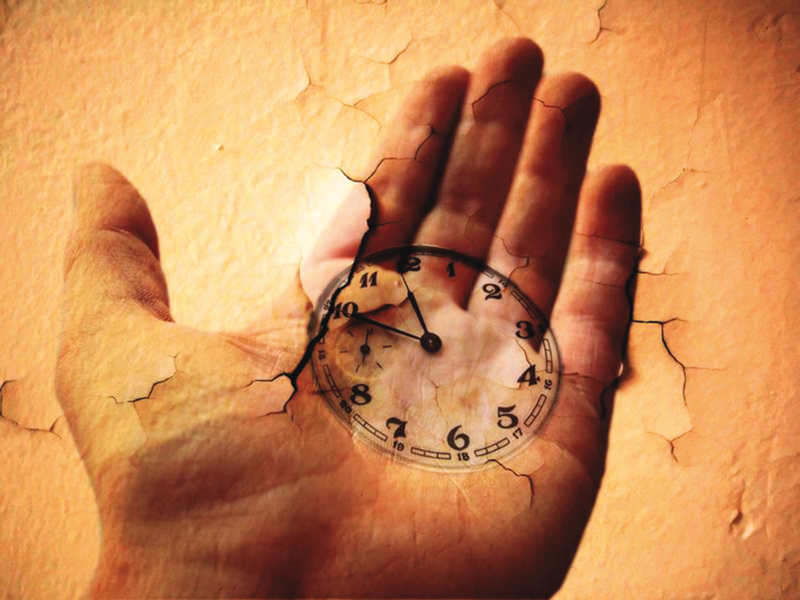
Having sought and found meaning in the jaws of death, he lived his life with a passion and thirst for adventure and exploration and a profound understanding of how to walk in ways of peace and guide his offspring in these ways.
In the katha Upanishad, nauchiketas first has to make a very important choice—to choose his three boons. His first boon is the one any child in his position might ask for. He wants his father to be happy and reconciled with him. For his second boon, he asks to learn specific rituals that will lead to Heaven. But for his final boon, nauchiketas asks Yama to answer the ultimate question. What happens when we die? Yama tries in every possible way to put the boy off. He offers him fabulous wealth, luxuries, vast lands, even kingship. But nauchiketas points out that all these things are impermanent and here, in the Halls of death, have no meaning. He insists upon the boon he has chosen—to know the meaning of death and hence of life.
And the answer death gives is simple. There is a fundamental choice in life—a choice between the good and the pleasant. By choosing his final boon, nauchiketas has already made this choice. We make this choice in a big way once in our lifetime, by choosing to step on the spiritual path. Having made this choice, we will be held to it. If we step off the path, we will be guided back. But we also face this choice in a myriad of small ways throughout each day. It takes constant discrimination to choose the good, to examine each possibility and ask, “does it benefit?”
In my beginning is my end leads us to question, as nauchiketas did, what happens when we die. Who is it that dies? Who am I? In my end is my beginning is the answer to this question. Yama says to nauchiketas, “The self is never born, never dies. He sprang from nothing, and nothing sprang from him. He is the Unborn, the Eternal, the Abiding, the Ancient one. He is not slain when the body is slain.”
As Jesus said, “Whoever wants to save his life will lose it, but whoever loses his life for Me will find it.” If we understand that when Jesus says ‘for Me’ he refers to the Eternal Self, he is clearly saying In my end is my beginning. We let go of our clinging to this temporary life, destined to end in death, and enter into our true identity as the one who is never born and never dies.
Yama goes on, “Smaller than the smallest, greater than the greatest, the Self abides in the heart of every being.” All the endings in life are so painful for us. Birth is a joyful occasion, but it ends our womb life in pain and struggle. Weddings too are seen as joyful occasions, yet many tears are shed at weddings, because the new beginning also brings an ending. The dawn of a new year brings the old year to an end as we realize that all it held is just a memory. death is perceived as a sorrowful event, yet it is a birth into a new reality.
Our experience of pain in endings comes from our deep-rooted identification with temporary things and our ephemeral body. We forget, again and again, that which abides in the heart of everything. “knowing the Self, bodiless among bodies, the abiding among the ephemeral… the wise man does not grieve,” says Yama.
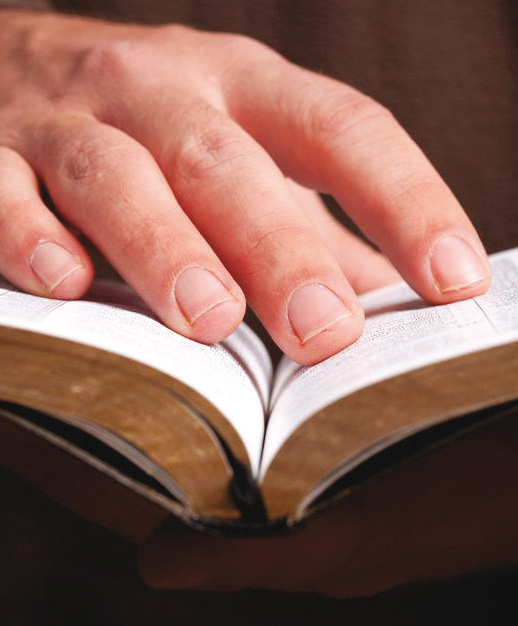
Die before you die and be resurrected now! These profound words from Rumi remind us that we do not need to wait for our bodily death to find the new, transcendent beginning contained within our ending. Every day, life offers us fresh invitations to transcendence. For some, as for my father, a life-threatening illness evokes meaning and transcendence, calling upon us to let go of our identification with that which dies. Or perhaps the death of a friend of similar age comes as a reminder that we too will die—unless we enter into that which does not die. I always enjoy my birthday, a few days before the winter solstice, as an occasion to gather with friends and experience warmth and light on a dark evening. Yet with each birthday, life’s ending draws closer. So a birthday brings a very special gift, a card from the cosmos saying “Resurrection now!”
At the ending of each day we enter into sleep, the little death. In the sacred moments between waking and sleeping, we have a unique opportunity to direct our minds towards the dweller in the heart. The Self remains ever wakeful, conscious and aware. And as day dawns, we are resurrected from the sleep state to the waking state. The sun rises, calling us not just to wake up, but to awaken. “That radiant being in yonder sun, soham asmi—I myself am that,” says Isha Upanishad.
life and death offer invitations, yet it is up to us to respond. The practice of meditation helps us learn to read the invitation and gain the skills to respond through moment-to-moment awakening. In our meditation, we are choosing to die before we die. We let go of our activities and set aside time to do nothing. The past and the future keep beckoning us, with all the agendas and notions that make up our temporal identity. Yet we bring ourselves back, again and again, to this moment, this breath. We see that each breath dies into the next as day dies into night and night into day. With each day, with each sitting, with each conscious breath, we die before we die and are resurrected now. As nauchiketas leaves the halls of death alive, awake and enlightened, we awaken, moment by moment into the new beginning that is beyond all endings. In this body, in this life, without any fanfare or grandiose experiences, but with ease, gentleness and simplicity, we pass beyond the sphere of death into the immortality that was and always is our true nature.
We must be still and still moving
Into another intensity
For a further union, a deeper communion
Through the dark cold and the empty desolation
The wave cry, the wind cry, the vast waters
Of the petrel and the porpoise.
In my end is my beginning.
– TS Eliot, East Coker, Four Quartets
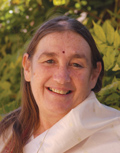 Alakananda Ma graduated as a physician from St. Bartholomew’s Hospital Medical College. In 1980, she embarked on a five-year spiritual pilgrimage in India, meeting her Ayurveda teacher, Dr. Vasant Lad. One of the first Western physicians to dedicate her life to Ayurveda, Ma has been practicing Ayurveda since 1989 and is the principal teacher of Alandi Ayurveda Gurukula. www.alandiashram.org.
Alakananda Ma graduated as a physician from St. Bartholomew’s Hospital Medical College. In 1980, she embarked on a five-year spiritual pilgrimage in India, meeting her Ayurveda teacher, Dr. Vasant Lad. One of the first Western physicians to dedicate her life to Ayurveda, Ma has been practicing Ayurveda since 1989 and is the principal teacher of Alandi Ayurveda Gurukula. www.alandiashram.org.

